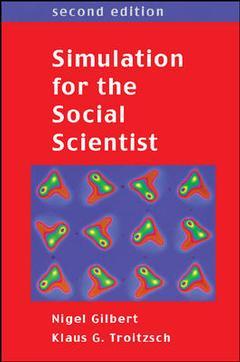Description
Simulation for the social scientist (2nd ed )
Authors: GILBERT, TROITZSCH
Language: English
Approximative price 95.13 €
Subject to availability at the publisher.
Add to cart
Publication date: 02-2005
288 p. · Hardback
288 p. · Hardback
Description
/li>Contents
/li>
-What can computer simulation contribute to the social sciences? -Which of the many approaches to simulation would be best for my social science project? -How do I design, carry out and analyse the results from a computer simulation? This is a practical textbook on the techniques of building computer simulations to assist understanding of social and economic issues and problems. Interest in social simulation has been growing rapidly worldwide as a result of increasingly powerful hardware and software and also a rising interest in the application of ideas of complexity, evolution, adaptation and chaos in the social sciences. This authoritative book details all the common approaches to social simulation, to provide social scientists with an appreciation of the literature and allow those with some programming skills to create their own simulations. New for this edition is a chapter on how to use simulation as a tool. A new chapter on multi-agent systems has also been added to support the fact that multi-agent modelling has become the preferred approach to simulation. Social scientists in a wide range of fields will find this book an essential tool for research, particularly in sociology, economics, anthropology, geography, organizational theory, political science, social policy, cognitive psychology and cognitive science. It will also appeal to computer scientists interested in distributed artificial intelligence, multi-agent systems and agent technologies.
1: Simulation and social science
2: Simulation as a method
3: Systems dynamics and world models
4: Microanalytical simulation models
5: Queuing models
6: Multilevel simulation models
7: Cellular automata
8: Multi-agent models
9: Developing multi-agent systems
10: Learning and evolutionary models
Appendix A (websites)
Appendix B (Linear stability analysis of the hawk'dove'lawabider model)
Appendix C (Random number generators)
2: Simulation as a method
3: Systems dynamics and world models
4: Microanalytical simulation models
5: Queuing models
6: Multilevel simulation models
7: Cellular automata
8: Multi-agent models
9: Developing multi-agent systems
10: Learning and evolutionary models
Appendix A (websites)
Appendix B (Linear stability analysis of the hawk'dove'lawabider model)
Appendix C (Random number generators)
© 2024 LAVOISIER S.A.S.




